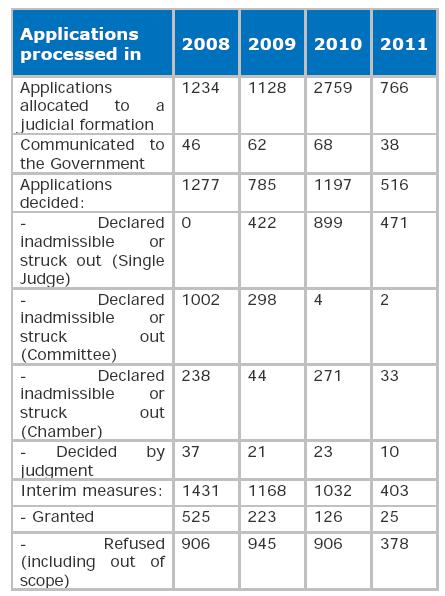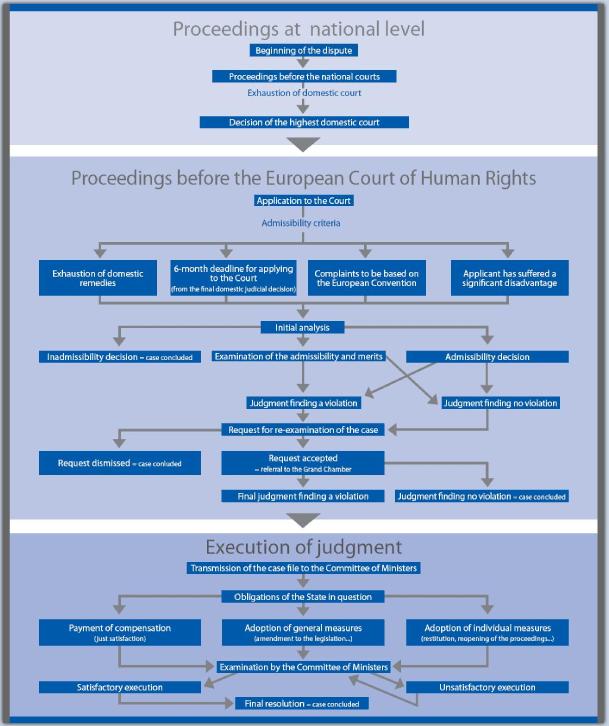Did the European Court of Human Rights find a violation in just eight UK cases in 2011?
"Not quite a thousand cases go from Britain to the European court each year and they're all filtered out and only eight remain and actually go before a court so there already is a filtering process."
Baroness Helena Kennedy QC, BBC Today Programme, 25 January 2012
"...To take 2011 as the most recent example: of the 955 applications against the UK decided, the court found a violation of the convention in just eight cases."
Sir Nicholas Bratza, Vice President of ECtHR, The Independent, 24 January 2012
Join 72,953 people who trust us to check the facts
Sign up to get weekly updates on politics, immigration, health and more.
Subscribe to weekly email newsletters from Full Fact for updates on politics, immigration, health and more. Our fact checks are free to read but not to produce, so you will also get occasional emails about fundraising and other ways you can help. You can unsubscribe at any time. For more information about how we use your data see our Privacy Policy.
With David Cameron making a speech yesterday calling for reform of the European Court of Human Rights (ECtHR), some commentators seemed to offer conflicting accounts of the cases settled in relation to the UK.
Full Fact tries to sort out the confusion.
Analysis
Full Fact previously highlighted problems with the Mail and Telegraph's reporting of the figures, which came down in part to misleading terminology. Yesterday the Guardian's Reality Check blog also looked into the latest claims.
The source of the confusion is, again, based on the way the claims have been formulated. The ECtHR provide extensive definitions of their statistical terms and terminology more generally. However this failed to prevent certain terms from being conflated in the British press.
The ECtHR's country profiles provide preliminary data of cases from 2011. The UK's own profile provides the following breakdown:

As is apparent, not all 'applications' are decided upon, and not all 'decisions' are admissible, moreover not all admissable decisions find a violation. In 2011, out of 766 accepted applications, 516 went to a decision stage, and ten went to judgement.
To illustrate further, the ECtHR provide a useful (but complex) chart outlining the procedures:

The ECtHR's index on cases provides some detail on the decisions and judgements made involving the UK. From this data, we can confirm the eight cases finding a violation that Sir Nicholas Bratza sepaks of. They are:
1) MGN Limited v. the United Kingdom, no. 39401/04, 18 January 2011
2) Sufi and Elmi v. the United Kingdom, nos. 8319/07 and 11449/07, 28 June 2011
3) Al-Jedda v. the United Kingdom [GC], no. 27021/08, 7 July 2011
4) Al-Skeini and Others v. the United Kingdom [GC], no. 55721/07, 7 July 2011
5) A.A. v. the United Kingdom, no. 8000/08, 20 September 2011
6) Al-Khawaja and Tahery v. the United Kingdom [GC], nos. 26766/05 and 22228/06, 15 December 2011
7) Hanif and Khan v. the United Kingdom, nos. 52999/08 and 61779/08, 20 December 2011
8) Minshall v. the United Kingdom, nos. 7350/06, 20 December 2011
Conclusion
Much of the confusion that may be caused by reading ECtHR figures concerns the precise terminology the Court employs. An 'application' is not necessarily a 'decision', nor is a decision necessarily a 'judgement', nor do all judgements find a 'violation'.
From what we have learnt, Baroness Helena Kennedy QC's comments on the Today program do not seem to be quite right, since the eight cases she seems to be referring to were not merely those "going before a court" but those in which a violation was found.